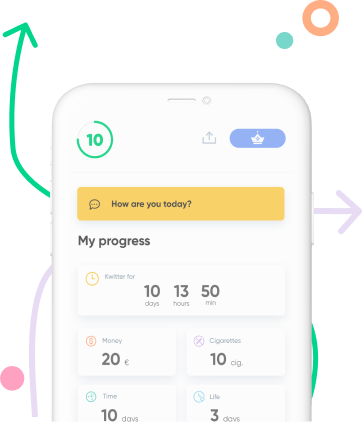March 26, 2019
Tips
Sleep disorders and smoking cessation: what is the link?
You have sleep disorders but you don't know why? It's a step in quitting smoking, but don't worry, it doesn't last!Kwit explains everything in this article.
As we all know, quitting smoking is not easy and not without its difficulties. Indeed, with the smoking cessation, the body will react. This is called withdrawal syndrome. Thus, during this period, withdrawal is accompanied by various symptoms such as anxiety, irritability, fatigue, increased appetite, weight gain and sleep disorders. These disorders are in fact only temporary and can be regulated. This is why it should not discourage you because the benefits of smoking cessation are disproportionate to these specific disorders. Deciphering of smoking cessation and sleep disorders.
Smoking cessation and sleep disorders
It is true that during smoking cessation, the person often experiences sleep disorders for about 3 weeks. This is due to the lack of nicotine, which is difficult for the body to do without.
According to an article published on the website of The National Center for Biotechnology Information , it is confirmed that sleep disorders make smoking cessation more difficult and promote relapse. Insomnia is part of the criteria for smoking cessation syndrome. Night awakenings and daytime sleepiness are frequent. They are predictive factors for relapse. In addition, Nicotine replacement therapy causes frequent awakenings, a decrease in total sleep duration, an increase in dreams and nightmares.
This is why this sleep disorder issue must be taken into account during the period of smoking cessation.
Tips for better sleep during smoking cessation
To help you sleep better during the smoking cessation period, we can use one or more of the following tips, depending on your choice:
Resume physical activity: the more you exercise, the less you want to smoke and the better you sleep.
Know your sleep rhythm well and don't miss your sleep phase at fixed times.
Keep regular sleep cycles.
Prepare for sleep in peace and quiet.
In winter, lower the temperature in your room.
Eat light in the evening and without excessive alcohol.
Do not drink coffee or tea in the evening, but rather a chamomile or lime blossom tea.
More generally, practice regular relaxation sessions.
You can get help from specialized organizations that will support you in your withdrawal process. Kwit is a good custom tool that can contribute to this.

Some inconveniences for great benefits
In the end, it should not be forgotten that these sleep disorders are temporary. By following the advice given, they will be greatly reduced. This is why it is necessary to be patient and especially not to abandon the smoking cessation cure. Think about the expected benefits in terms of physical and psychological health and do not forget the financial savings that can be used in a dream vacation or other purchases to please yourself!
So endure some temporary sleep disorders to take up your challenge and get rid of the tobacco chains!




